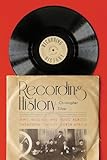Recording history : Jews, Muslims, and music across twentieth-century North Africa / Christopher Silver.
Material type: TextPublication details: Stanford, California : Stanford University Press, (c)2022.Description: 1 online resource (xvii, 300 pages) : illustrations, mapsContent type:
TextPublication details: Stanford, California : Stanford University Press, (c)2022.Description: 1 online resource (xvii, 300 pages) : illustrations, mapsContent type: - text
- computer
- online resource
- 9781503631694
- ML3502 .R436 2022
- COPYRIGHT NOT covered - Click this link to request copyright permission: https://lib.ciu.edu/copyright-request-form
| Item type | Current library | Collection | Call number | URL | Status | Date due | Barcode | |
|---|---|---|---|---|---|---|---|---|
 Online Book (LOGIN USING YOUR MY CIU LOGIN AND PASSWORD)
Online Book (LOGIN USING YOUR MY CIU LOGIN AND PASSWORD)
|
G. Allen Fleece Library ONLINE | Non-fiction | ML3502.5 (Browse shelf(Opens below)) | Link to resource | Available | on1295619052 |
Includes bibliographies and index.
Introduction -- The birth of the recording industry in North Africa -- The Arab Charleston and the foxtrot -- Nationalist records -- Listening for World War II -- Singing independence -- Curtain call -- Conclusion.
"A new history of twentieth-century North Africa, that gives voice to the musicians who defined an era and the vibrant recording industry that carried their popular sounds from the colonial period through decolonization. If twentieth-century stories of Jews and Muslims in North Africa are usually told separately, Recording History demonstrates that we have not been listening to what brought these communities together: Arab music. For decades, thousands of phonograph records flowed across North African borders. The sounds embedded in their grooves were shaped in large part by Jewish musicians, who gave voice to a changing world around them. Their popular songs broadcast on radio, performed in concert, and circulated on disc carried with them the power to delight audiences, stir national sentiments, and frustrate French colonial authorities. With this book, Christopher Silver provides the first history of the music scene and recording industry across Morocco, Algeria, and Tunisia, and offers striking insights into Jewish-Muslim relations through the rhythms that animated them. He traces the path of hit-makers and their hit records, illuminating regional and transnational connections. In asking what North Africa once sounded like, Silver recovers a world of many voices--of pioneering impresarios, daring female stars, cantors turned composers, witnesses and survivors of war, and national and nationalist icons--whose music still resonates well into our present"--
COPYRIGHT NOT covered - Click this link to request copyright permission:
There are no comments on this title.
